The Military Order of the Loyal Legion of the United States (MOLLUS), or, simply, the Loyal Legion, is a United States military order organized on April 15, 1865, by three veteran officers of the Union Army. The original membership was composed of commissioned officers of the Regular or Volunteer Army, U.S. Navy, or U.S. Marine Corps who served during the American Civil War, or who had served and thereafter been commissioned and who thereby "had aided in maintaining the honor, integrity, and supremacy of the national movement" during the Civil War.

Cobb Divinity School was a Baptist theological institute. Founded in 1840, it was a Free Will Baptist graduate school affiliated with several Free Baptist institutions throughout its history. Cobb was part of Bates College in Lewiston, Maine, United States from 1870 until 1908 when it merged with the college's Religion Department.
William Hayes Googins was a Union veteran of the American Civil War. He was a soldier in the 27th Maine Regiment known for its controversial, and later revoked, Medals of Honor.

The 27th Maine Infantry Regiment was a nine-month regiment raised for service in the Union Army during the American Civil War.

Benjamin Edward Bates IV was an American rail industrialist, textile tycoon and philanthropist. He was the wealthiest person in Maine from 1850 to 1878.
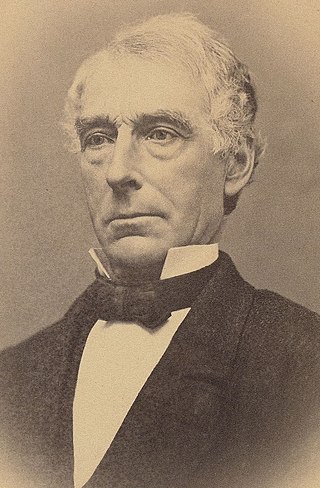
Alonzo Garcelon was the 36th governor of Maine, and a surgeon general of Maine during the American Civil War.
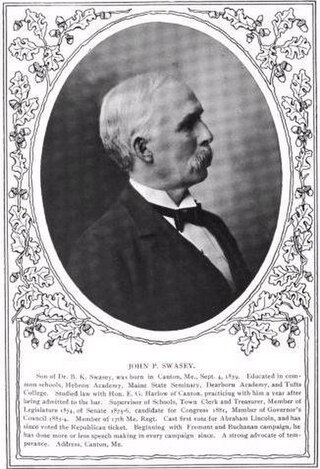
John Philip Swasey was U.S. Representative from Maine from 1908 to 1911.
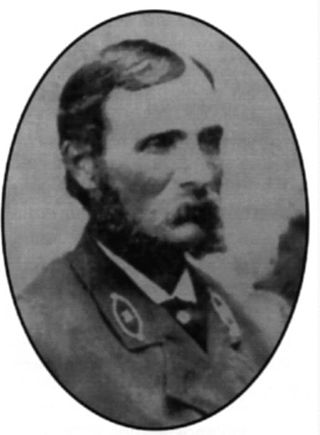
Marcus Aurelius Hanna was an American lighthouse keeper famous for his heroism. He is the only person in history to have received both the Medal of Honor and the Gold Lifesaving Medal.

Franklin Bachelder Simmons was a prominent American sculptor of the nineteenth century. Three of his statues are in the National Statuary Hall Collection, three of his busts are in the United States Senate Vice Presidential Bust Collection, and his statue of Ulysses S. Grant is in the United States Capitol Rotunda.
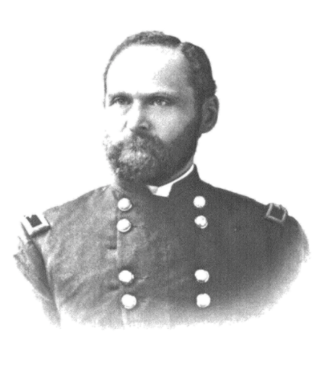
Aaron Simon Daggett was a career United States Army officer. He was the last surviving brevet Union general of the American Civil War, and the last surviving general of any grade from the war, when he died exactly one month shy of his 101st birthday in 1938. Daggett was nominated for appointment to the grade of brevet brigadier general, to rank from March 13, 1865, by President Andrew Johnson on February 21, 1866 and was confirmed by the United States Senate on April 10, 1866. During the war, Daggett fought at West Point, Gaines' Mill, Golding's Farm, White Oak Swamp, Second Bull Run, South Mountain, Antietam, Rappahannock Station, Fredericksburg, Battle of Gettysburg, Battle of Mine Run, Battle of the Wilderness and Battle of Cold Harbor. Daggett was a brigadier general of volunteers in the Spanish–American War. He was appointed to the brigadier general grade to rank from September 1, 1898 and was mustered out of the volunteers on November 30, 1898. He was promoted to brigadier general in the Regular Army ten days before his retirement from the army on March 2, 1901.

Jacob Gellert Frick Sr. was a United States infantry officer who fought with several Union Army regiments during the American Civil War, including as lieutenant colonel of the 96th Pennsylvania Infantry and as colonel of the 129th Pennsylvania Infantry. He received his nation's highest award for valor, the U.S. Medal of Honor, for his gallantry during the battles of Fredericksburg and Chancellorsville, Virginia. Grabbing the American flag from his regiment's color-bearer at Fredericksburg on December 13, 1862, he inspired his men to move forward "through a terrible fire of cannon and musketry"; at Chancellorsville, he personally engaged in hand-to-hand combat on May 3, 1863, to retrieve his regiment's flag which had been captured by the enemy. He was 67 years old when his Medal of Honor was conferred on June 7, 1892.

Enoch Foster was a justice of the Supreme Judicial Court of Maine.
The 41st Regiment Massachusetts Volunteer Infantry was a three-year infantry regiment that served in the Union Army during the American Civil War. It was recruited as part of Governors Banks' and Andrew's recruitment drives to supply the union with a military force to hold and expand Union control of the lower Mississippi. In the late winter/early spring of 1863, it was converted to mounted infantry and later to cavalry. On its conversion in June 1863 at Port Hudson, it was disestablished and re-established as the 3rd Massachusetts Volunteer Cavalry.

The 6th Maine Infantry Regiment was an infantry regiment that served in the Union Army during the American Civil War.
Riverside Cemetery is a cemetery in Lewiston, Maine. The 40-acre (16 ha) cemetery is located on the bank of the Androscoggin River which flows through Lewiston. It is owned by the Riverside Cemetery Association.

The history of Bates College began shortly before Bates College's founding on March 16, 1855, in Lewiston, Maine. The college was founded by Oren Burbank Cheney and Benjamin Bates. Originating as a Free Will Baptist institution, it has since secularized and established a liberal arts curriculum. After the mysterious 1853 burning of Parsonsfield Seminary, Cheney wanted to create another seminary in a more central part of Maine: Lewiston, a then-booming industrial economy. He met with religious and political leaders in Topsham, to discuss the formation of such a school, recruiting much of the college's first trustees, most notably Ebenezer Knowlton. After a well-received speech by Cheney, the group successfully petitioned the Maine State Legislature to establish the Maine State Seminary. At its founding it was the first coeducational college in New England. Soon after it was established, donors stepped forward to finance the seminary, developing the school in an affluent residential district of Lewiston. The college struggled to finance its operations after the financial crisis of 1857, requiring extra capital to remain afloat. Cheney's political activities attracted Benjamin Bates, who was interested in fostering his business interests in Maine. Bates donated installments of tens of thousands of dollars to the college to bring it out of the crisis.
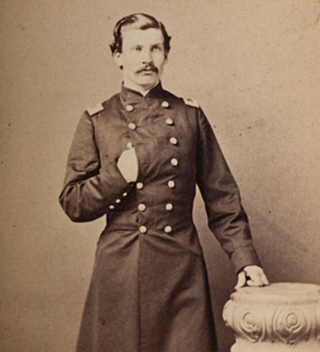
Charles Porter Mattocks was a colonel in the Union Army who received the Medal of Honor. He was born in Danville, Vermont, and served in the 17th Maine Infantry during the American Civil War. He was captured and interned as a prisoner of war for nine months. Later, he commanded the Maine State Militia and served as a brigadier general during the Spanish–American War. He was elected to the Maine House of Representatives in 1880, was a county attorney for Cumberland County, Maine, and argued a case before the Supreme Court.

Benjamin Franklin Hayes was an American judge, state representative, and state senator from Medford, Massachusetts.
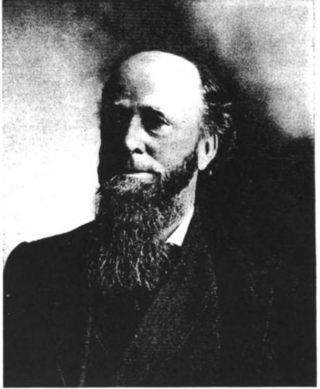
John Alfred Hayes (1839–1913) was a Union Army surgeon and officer during the American Civil War and later a physician in New Hampshire.















